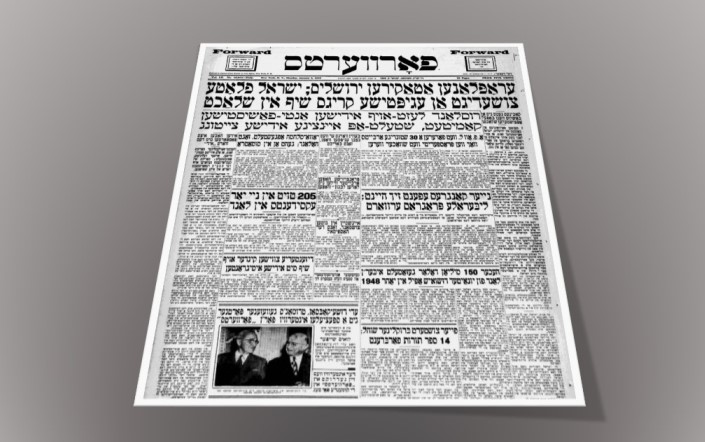Nash Holos: Harry Lang and the Ukrainian Famine

Welcome to Ukrainian Jewish Heritage on Nash Holos Ukrainian Roots Radio. I’m Peter Bejger.
Today we begin with a dispatch from the past.
“Kiev in the morning. A lot of people are already walking on the main street Khreshchatyk, now called ‘Vorovski.’ Everybody holds under their arm a stick of plain black bread, and everyone picks crumbs from it and drops it in their mouth. This applies to men, to women and to children: constantly, constantly, constantly. Everybody has a stick of plain black bread under their arm, under their suit coat, under their overcoat. And from there they pick: crumbs, crumbs, crumbs. So it goes for an entire city”
This traveler’s account from the Ukrainian capital in the autumn of 1933 hints at the disaster that afflicted the country in those grim years of the brutal man-made Famine. And this rare account comes from one of the very few Westerners allowed into Ukraine at that time.
Harry Lang was the labor editor of the Yiddish-language newspaper Jewish Daily Forward, or Forverts, published in New York. It was then the largest and most influential Yiddish newspaper in the world and the largest non-English language newspaper in the United States.
Lang and his wife Lucy spent several weeks traveling freely throughout Ukraine, Belarus, and Russia. They were able to get in due to a letter of reference by the American Senator William E. Borah, who was the leading advocate for the diplomatic recognition of the Soviet Union by the United States.
The Langs had a background to make their trip a journalistic success. They were both born in the Tsarist Empire. Harry in Lithuania and Lucy in Kyiv. Both spoke Russian and Yiddish. They could talk with Soviet citizens without the need of an interpreter. In addition, Lucy Lang had extensive connections in Kyiv with influential relatives who had participated in the revolution, joined the Communist Party, and had risen into the higher ranks.
What is even more fascinating is that the Langs were able to put their trip into a broader context. Their trip in 1933 first took them to the Middle East, including Palestine, then to Western Europe, and finally the Soviet Union. Harry Lang’s comparison of an impoverished Jewish collective farm near Kharkiv with the thriving kibbutzim in Palestine ruffled feathers.
Lang pointed out, “I visited Jewish rural people in several countries. The Palestinian villages have incorporated into their hearts the most beautiful singing…their “collectivization” has been imposed by no one.”
In contrast, Lang was particularly scathing about the state of Jewish life in the bleak and coercive conditions of the Soviet collective farm. He was particularly upset by the state of education and wrote, “What indeed do these schools teach them? Everything which has been connected to Jewish intellectualism has been wiped out.”
But the tragedy of the Ukrainian countryside in the early 1930s went beyond any deficiencies in rural schools. From one of his excursions deep into the countryside Lang writes of the all-encompassing tragedy, “Fields and roads under soldiers…The worst, however, comes later. Driving from village to village we come upon a village of death…Several dozen little houses, the doors nailed up, not a single creature inside, not a single creature in the gardens and fields surrounding dead chimneys on the roofs, dead windows.”
Lang wrote a series of about thirty articles about the Soviet part of the trip that were published in the Forward newspaper between November 1933 and February 1934. His wife Lucy included some material from the trip in her autobiography Tomorrow is Beautiful that was published in 1948.
Lang’s articles outraged pro-Soviet readers of the Forward at a time when the United States had finally recognized the Soviet Union and many Americans were eager for improved Soviet-American relations. Harry Lang was publicly vilified. He was expelled from the Socialist Party and efforts were made to dismiss him from the newspaper. He was even threatened with assassination. Lang remained with the Forward for the rest of his career and passed away in California in 1970.
Four of Lang’s articles have been recently posted on the website www.academia.edu. Roman Serbyn, a historian and professor emeritus of Russian and East European history at the University of Quebec at Montreal, compiled and edited the texts, which were translated from the Yiddish into English by Moishe Dolman of Montreal.
Harry Lang’s harrowing accounts of famine-gripped Ukraine offers a poignant perspective on the Ukrainian Jewish encounter. He bore witness at one of the cruelest moments in Ukrainian history. “The peasants were accustomed to waking up in the morning when the cocks would begin to crow,” he wrote. “Oh, how the peasants were accustomed! They would sing at work. This is something you don’t hear now. It goes without saying that the Ukrainian song of the field, of the steppe, has become famous throughout the world. In Ukraine itself, however, the song is silent. There is no singing in the Ukrainian fields.”
This has been Ukrainian Jewish Heritage on Nash Holos Ukrainian Roots Radio. From San Francisco, I’m Peter Bejger.
Until next time, shalom!
Listen to the program here.
Ukrainian Jewish Heritage is brought to you by the Ukrainian Jewish Encounter (UJE), a privately funded multinational organization whose goal is to promote mutual understanding between Ukrainians and Jews. Transcripts and audio files of this and earlier broadcasts of Ukrainian Jewish Heritage are available at the UJE website and the Nash Holos website.



















